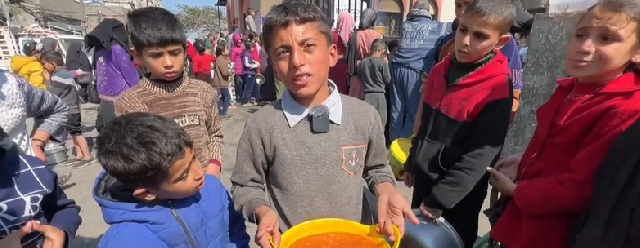Gaza children searching for food to keep families alive
 He takes a big plastic bowl and heads to schools that have become refugee centres
He takes a big plastic bowl and heads to schools that have become refugee centres
In certain places at certain times, just staying alive is something for a boy to be proud of - let alone going out every day to find the food that keeps your family from starving.
Every morning, Mohammed Zo'rab, 11, goes out into the southern Gaza city of Rafah on a mission.
He takes a big plastic bowl and heads to schools that have become refugee centres, and to makeshift camps on the roadside where people suffer like his own family but might still find something to feed the child of strangers.
Mohammed also goes to hospitals where the wounded arrive at all hours, and anywhere else where there might be a pot boiling over an open fire.
"When I go back to my family with this food, they get happy and we all eat together," he says.
"Sometimes I go empty handed and I feel sad."
Mohammed is the eldest of four children and lives with his mother, father and his siblings in a flimsy shelter made of plastic and tarpaulin.
His father, Khaled, roams around Rafah looking for odd jobs to raise five shekels (about $1.38; £1.08) to buy diapers for their two-month-old daughter, Howaida.
Mohammed is one of thousands of children who have become primary food gatherers for their families.
"When the line is crowded and there are almost 100 people in front of me, I sneak between people," he says, proud of his skill at navigating large crowds without getting into fights.
Back at home, he hands the bowl of baked beans to his mother, Samar, who distributes the food to the other children. She is gaunt and barely eats herself.
"I have cancer in my bones," she reveals. "I am 31-years-old but when you see me you think I'm 60. I can't walk.
"If I walk, I get very tired. All my body hurts and I need treatment and nutrition."
Like so many others, Samar and her family came to Rafah from their home further north in Khan Younis because the Israel Defense Forces (IDF) told them it would be safe. That was three months ago.
Since then, the war has come steadily closer to Rafah. More than 70 people were killed less than a fortnight ago when Israel launched a raid to rescue two hostages being held by Hamas.
The Zo'rab family's shelter leaks and the floor fills with rain. Sometimes, baby Howaida has no fresh diapers.
Each day offers relentless indignities in a place where 1.5 million people - five times the normal population - are crammed next to the Egyptian border.
With 85% of Gaza's population now displaced, the amount of aid getting into the enclave is nowhere near what is needed.
According to the United Nations (UN), five hundred trucks of aid per day are required. The daily average has been ninety.
The situation in northern Gaza is particularly acute.
Israel says the UN is failing to distribute aid in the north and that aid supplies are backed up - waiting to be collected on the Gaza side of the border.
The organisation has suspended movement of food aid in northern Gaza because it says there is no protection for truck drivers, who have faced attack by criminal gangs and looting by desperate people.
One truck was hit by shellfire, which the UN says came from an Israeli naval craft.
In addition, the Hamas-run police force in Gaza is no longer willing to escort food trucks because they fear being shot by the IDF.
Source: classfmonline.com
Trending World

Elon Musk's X bans European Commission from making ads after €120m fine
11:41
US could ask foreign tourists for five-year social media history before entry
19:06
Benin coup plot leader hiding in Togo, official says
19:03
Nobel Peace Prize winner's daughter accepts award on her behalf
18:55
Austria bans headscarves in schools for U-14s
16:09
Trump launches $1m 'gold card' immigration visas
16:08
Kenyan court suspends 'landmark' US health aid deal over data privacy concerns
15:56
About 200 West African soldiers in Benin for 'clean-up' after failed coup
15:58
Ethiopia arrests nine TikTok creators in social media crackdown
15:56
Germany accuses Russia of 2024 cyber-attack and disinformation
15:50



